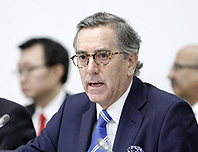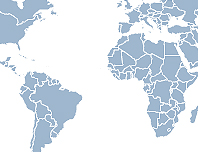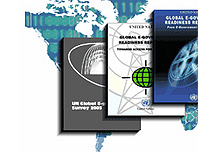DESA News
Volume 17, No.12 - December 2013
Trends and analysis
 The International Workshop on e-Government Best Practices to be hosted by the Jordanian Ministry of ICT and jointly organized by UN DESA and UNESCWA will aim to provide a platform for senior level official from Arab region and across the world to disseminate best practices and discuss trends, achievement and challenges in implementing e-government initiatives. The event will take place in Amman, Jordan on 3-5 December.
The International Workshop on e-Government Best Practices to be hosted by the Jordanian Ministry of ICT and jointly organized by UN DESA and UNESCWA will aim to provide a platform for senior level official from Arab region and across the world to disseminate best practices and discuss trends, achievement and challenges in implementing e-government initiatives. The event will take place in Amman, Jordan on 3-5 December.
Information and Communication technologies have had a significant impact on modernization of public administration and governance. Government electronic services have been developed not only to simplify government procedures and improve interaction with citizens, but also to create new governance models that would empower citizens and involve them in the decision-making process as well as increase transparency and accountability of governance.
Arab countries have all realized the importance of a well-conceived e-government strategy and have launched national e-government initiatives. They have placed a high priority on the development of e-government programs and mobilized human and financial resources for their implementation. In some Arab countries, the focus of e-government initiatives has shifted from the provision of services through one-stop-shop portals to more advanced concepts such as open data initiatives.
Recognizing the important role of UN DESA in advancing e-government agendas at the global and regional levels and building upon a successful cooperation on the organization of the UN Workshop on “Promoting Governance through Innovation and ICT” during the UNPSA 2013 in Manama, Kingdom of Bahrain, the ICT Division of the UN Economic Commission for Western Asia (UNESCWA) requested the cooperation of eGB/DPADM/UN DESA to jointly organize this “International Workshop in Promoting e-Government Best Practices”.
The event will be hosted by the Jordanian Ministry of ICT and organized jointly by UN DESA and UNESCWA. It will take place on 3-5 December, 2013 at UNESCWA Technology Center in Amman with over 60 participants expected to attend. The International Workshop will explore achievements and challenges faced by Arab countries in designing and implementing e-government best practices as they relate to the role of institutions and leaders, identify leadership capacity building needs and develop partnership for capacity building in the region.
It will run for three days and include 16 working sessions aiming at building capacities of funded and non-funded participants on the mechanisms to design, implement and ensure sustainability of online public service delivery through the exchange of ideas, experiences and best practices amongst and between Arab countries and other regions of the world. The end goal is to improve public service delivery, achieve the increased understanding and technical capacities of decision makers on the improvements in institutional framework needed to increase the level of e-government readiness. It will do so through the facilitation of an active dialogue between UN DESA, UNESCWA, invited experts, high level officials, representatives of international organizations, the business community and other stakeholders.
For more information on e-Government, visit the website of DESA’s Division Division for Public Administration and Development Management.
 The “Expert Group Meeting for the Global Sustainable Development Report 2013 – Engaging National Assessments” will take place from 12 to 13 December in Beijing. It is co-sponsored by UN DESA and the Ministry of Science and Technology of the People’s Republic of China.
The “Expert Group Meeting for the Global Sustainable Development Report 2013 – Engaging National Assessments” will take place from 12 to 13 December in Beijing. It is co-sponsored by UN DESA and the Ministry of Science and Technology of the People’s Republic of China.
The meeting will open with statements by Under-Secretary-General Wu-Hongbo and the host country’s Vice Minister of Science and Technology, among others.
One of the functions of the High Level Political Forum on sustainable development (HLPF), which was inaugurated on 24 September 2013, is to strengthen the science-policy interface. This is to be done, among other things, by bringing together dispersed information and assessments, including in the form of a global sustainable development report, building on existing assessments, and enhancing evidence-based decision-making at all levels.
The Expert Group Meeting is intended to contribute to the work of the HLPF on the above issues. It will bring together leading scientists and experts involved in preparing national reports or related sustainable development assessments, in order to ensure that their research findings and analytical perspectives will be featured in the Global Sustainable Development Report. The modality of future collaboration among the experts will also be discussed during the meeting.
Further information can be found on the Sustainable Development Knowledge Platform.
 The 2013 ECOSOC Presidential Expert Meeting took place on 15-16 November at the Greentree Foundation in Manhasset, New York. The theme of the event was “The ECOSOC We Want: Renewing commitment, confronting new challenges”. The Meeting was convened by H.E. Néstor Osorio, President of ECOSOC, and organized by UN DESA’s Office for ECOSOC Support and Coordination.
The 2013 ECOSOC Presidential Expert Meeting took place on 15-16 November at the Greentree Foundation in Manhasset, New York. The theme of the event was “The ECOSOC We Want: Renewing commitment, confronting new challenges”. The Meeting was convened by H.E. Néstor Osorio, President of ECOSOC, and organized by UN DESA’s Office for ECOSOC Support and Coordination.
The event brought together over 60 participants, including former ECOSOC Presidents, the current ECOSOC Bureau, Permanent Representatives, other representatives from Member States and experts, to discuss the way forward for ECOSOC after the adoption by the General Assembly of resolutions 67/290 on the High-level Political Forum and 68/1 on strengthening ECOSOC.
The opening session was devoted to defining the pressing development challenges to sustainable development in the social, economic and environment areas that would need to address, such as geo-political and geo-economic shifts, climate change, youth, women, the communications revolution, urbanization and migration, science and technology and inequality.
A number of key messages emerged from the four separate working groups:
Furthering engagements with national stakeholders
Discussions underlined that ECOSOC has to play a leading role in choosing relevant and attractive topics to a broad range of stakeholders, and that could attract participation from country capitals. The Council’s working methods and proceedings should therefore also be opened to include national stakeholders and move away from the current model that limits the participation of private sector, the scientific community, parliamentarians and civil society organizations.
Enhancing the integration of the three dimensions of sustainable development
Emphasis was placed on the critical role the newly created integration segment of the Council is to play in bringing better understanding on how daunting challenges can be addressed from all the three dimensions of sustainable development and making concrete recommendations for action. In this connection, the role of all stakeholders, including ECOSOC’s subsidiary bodies should be augmented. The two transition years of 2014-2015 represent an opportunity to gather experience that will be relevant for the post-2015 architecture and implementation.
Strengthening the links between normative and operational activities
There was a broad agreement that the operational activities role of ECOSOC should go beyond its conventional role by enhancing dialogue on issues of system-wide concerns such as the responsiveness of the United Nations Development Assistance Frameworks (UNDAFs), national ownership, effective utilization of funds and the functioning of the Resident Coordinator system. Participants stressed that ECOSOC could also provide space for dialogue on overall guidance of operational activities and thus give voice to Member States that may have difficulties effectively influencing discussions at the governing body level, and/or in regional groups.
Enhancing the Council’s monitoring capacity to promote greater accountability
Monitoring and accountability mechanisms for the post-2015 development agenda should be built into the design of the new development framework. They should engage a wide range of stakeholders, especially parliaments, in order to better link global to national accountability. Broad-based participation will also be critical in defining the scope of such accountability – for what and to whom – both at the global and national levels. National reviews should continue to be carried out in the medium and long term to allow sufficient time to measure and monitor implementation.
The way forward
The new institutional architecture for this vision built on the Council, the General Assembly and the high-level political forum, all acting in unison, offers a historical opportunity. It is imperative to bring to them the relevant policymakers and experts so that their outcomes can become more effective. Working through the transition in 2014-2015, as the transformative development agenda beyond 2015 is finalized, requires moving beyond the process – to action and implementation. Systems can be modified as necessary to ensure that they remain fit and effective.
For more information on the work of the Economic and Social Council (ECOSOC), browse the Council’s website.
 New e-Government platforms and networks are dramatically changing the decision-making systems, business models and public service delivery mechanisms in both developed and developing countries. All this growing demand for ICT goods and services in the public and private sectors can potentially leverage the consolidation of improved governance, thus becoming the backbone of sustainable development through efficient public administration. On 26-27 November, the E-xperience Conference was held in Bogotá, Colombia, also featuring the launch of the Centre for Innovation on e-Government Development.
New e-Government platforms and networks are dramatically changing the decision-making systems, business models and public service delivery mechanisms in both developed and developing countries. All this growing demand for ICT goods and services in the public and private sectors can potentially leverage the consolidation of improved governance, thus becoming the backbone of sustainable development through efficient public administration. On 26-27 November, the E-xperience Conference was held in Bogotá, Colombia, also featuring the launch of the Centre for Innovation on e-Government Development.
The Ministry of Information and Communication Technologies of Colombia (MINTIC) has signed a Project Document with UNDP, having the e-Government Branch, Division for Public Administration and Development Management of UN DESA providing substantive support and implementing over 70% of all activities. The Project is the result of a specific request from the Colombian Government to UN DESA, having a budget of more than US$ 800,000 a year provided by Colombia.
The Project has been designed to benefit other countries in the region and globally, based on the principles created and disseminated by the UN e-Government Survey prepared by UN DESA. It also represents a new reference for innovative cooperation between Colombia, UN DESA and UNDP, having benefitted from significant constructive support from the UN Office of Legal Affairs (OLA) and the Capacity Development Office (CDO) of UN DESA.
The first major output of this partnership was the E-xperience Conference held in Bogotá on 26-27 November. The Conference launched the Centre for Innovation on e-Government Development, a pioneer initiative on a global scale. E-xperience will also discuss knowledge management aspects on how to leapfrog advancements in e-Government development to modernize government in terms of effectiveness, efficiency, transparency and inclusiveness. A series of countries already confirmed their presence and support to E-xperience, including Azerbaijan, Brazil, Bolivia, Costa Rica, Egypt, El Salvador, Guatemala, Indonesia, Kazakhstan, Panama, Paraguay, Peru, among others.
For more information: E-xperience Conference in Bogotá
 Following Russia ICT Day, organized by the World Bank in cooperation with Russia in Washington DC, a delegation of 42 high-level officials from the Russian Federation visited UN DESA’s Division for Public Administration and Development Management (DPADM) on 15 November, for a presentation on the United Nations e-Government Development Index (EGDI).
Following Russia ICT Day, organized by the World Bank in cooperation with Russia in Washington DC, a delegation of 42 high-level officials from the Russian Federation visited UN DESA’s Division for Public Administration and Development Management (DPADM) on 15 November, for a presentation on the United Nations e-Government Development Index (EGDI).
The Russian Federation has made significant progress in e-government development since 2010, both in absolute terms and relative to other countries, with a notable jump in its global ranking between 2010 (59th place) and 2012 (27th place). The gain can be attributed to: (a) a doubling in availability of government e-services; and (b) an increase in the number of Internet users (from 21% to 43% of the population) and fixed broadband subscriptions (from 3% to 11% of the population).
According to the World Bank, Russia has 76 million Internet users and an e-commerce turnover of $13 billion a year. The country’s e-government performance has reached the EU average, despite the challenges of a large population and vast geography. Its ICT industry boasts world-leading brands in the IT sector, fuelled by over 60,000 graduates in Science, Engineering and Mathematics each year.
To some extent, Russia has struggled with e-government development. The “Electronic Russia” programme (2002-2012) was an ambitious 9-year effort deemed by some observers to have been unsuccessful. Currently, Russia is pursuing an “Information Society State Programme” (2011-2020) with the aim of providing Russians with enhanced access to broadband Internet, developing the ICT sector, promoting Internet safety, and simplifying interaction between citizens and the State through e-government.
DPADM gave several presentations on the 2014 e-Government Survey, Capacity Development, Open Government Data, Public Service Awards and Forum, and Innovation Transfer followed by Q& As on the ways to improve e-Government performance on federal and local levels in the country and bring the benefits of the information society to all citizens.
Within the margins of the visit, Thomas Gass, DESA’s Assistant Secretary-General for Policy Coordination and Inter-Agency Affairs, met with the Minister of Communications and Mass Media of the Russian Federation, Mr. Nikolai Nikiforov, Permanent Representative of the Russian Federation to the United Nations, Mr. Vitaly Churkin and other high level officials and DPADM staff members.
Discussions were held on the future cooperation of UN DESA and Russian Government in the field of ICT and its use to enhance service delivery for public administration. It was agreed that Russian Government will invite DPADM Advisors to assess e-Government performance and provide guidance and recommendations on how the Government can overall improve public service delivery, bridge the digital divide, implement whole-of-government approach, greater use of social media and open government.
For more information: Website of DPADM
 The International Workshop on e-Government Best Practices to be hosted by the Jordanian Ministry of ICT and jointly organized by UN DESA and UNESCWA will aim to provide a platform for senior level official from Arab region and across the world to disseminate best practices and discuss trends, achievement and challenges in implementing e-government initiatives. The event will take place in Amman, Jordan on 3-5 December.
The International Workshop on e-Government Best Practices to be hosted by the Jordanian Ministry of ICT and jointly organized by UN DESA and UNESCWA will aim to provide a platform for senior level official from Arab region and across the world to disseminate best practices and discuss trends, achievement and challenges in implementing e-government initiatives. The event will take place in Amman, Jordan on 3-5 December.



